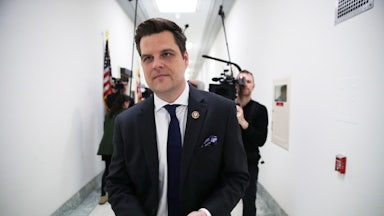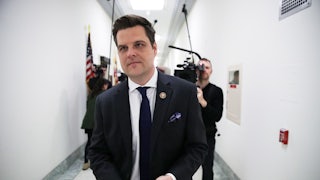Last September, an obscure, 36-year-old documentarian named Christopher Rufo landed a slot on Tucker Carlson Tonight. Knowing the president would be watching, he sounded the alarm about an ideology almost as obscure as he was: “critical race theory.” Rufo, who describes the theory as the notion that the United States was “founded on white supremacy and oppression,” begged Donald Trump to take action. Critical race theory, he warned, had become “the default ideology of the federal bureaucracy.” The next morning, Rufo got a call from Mark Meadows, the president’s chief of staff; just a few days later, the White House issued a bizarre memo instructing public agencies to root out the theory from government trainings.
In the months since Rufo’s TV appearance, roughly a dozen states from Idaho to Tennessee have passed or considered legislation banning critical race theory from schools and government institutions. Almost overnight, Rufo has become the standard-bearer for a hysterical movement to solve a problem that may not even exist—and in the process, charted a course for the right in the Biden era. With a likable moderate in the White House, the task for operatives like Rufo is to gin up evidence of an overwhelming conspiracy everywhere else, convincing voters that the left has taken over the school and the workplace.
Rufo has had an unusual career: He came up not through the traditional conservative blogosphere but as a man-about-town documentarian, who made a film about roughing it in Mongolia that The New York Times called “self-involved” and a PBS documentary about inner-city poverty. Last year, after the Floyd protests, he learned that the city of Seattle was hosting racial sensitivity trainings where white employees were urged to practice “self-talk that affirms [their] complicity in racism.” Supported by Patreon and, more recently, by a Manhattan Institute fellowship, Rufo started collecting tips from other “whistleblowers” about funky language in diversity trainings from Cupertino, California, where third-graders were asked to rank themselves according to privilege, to New York City, where a principal urged parents to be “white traitors” and advocate for “white abolition.” (Rufo did not answer questions about whether he has other affiliations or funding sources.)
The past year has produced a remarkable amount of hand-wringing and self-flagellation among middle-class white people, not all of it productive. But Rufo has framed these isolated instances of identitarian malapropism as evidence of an overarching Marxist plot to replace the “categories of bourgeoisie and proletariat with the identity categories of white and black.”
He says he has provided feedback on at least 10 of the critical race theory bills moving through state legislatures. He is adamant that they do not seek to govern what can be taught in the classroom, and from a textual standpoint, he may be right: The Idaho bill prevents schools from teaching “that any sex, race, ethnicity, religion, color, or national origin is inherently superior or inferior”; the Texas bill, meanwhile, stops schools from saying any individual is “inherently racist, sexist, or oppressive.” The rhetorical gambit is for the text to mimic the facially neutral language of civil rights even as the rhetoric around the bill conjures up a Marxist menace.
Of course, it remains unclear who would enforce these laws. But Rufo and his fellow crusaders don’t seem particularly interested in that. The single greatest threat to the Republican Party is its newfound electoral weakness in the suburbs; in order to regain strength in those areas, especially during a midterm that will draw out a more educated segment of the electorate, the conservative movement must convince suburban voters that the other side represents an unthinkable Marxist menace. With a slew of state bills and an obsessive focus on a few isolated statements by misguided public employees, Rufo is attempting to convince swingable voters that liberals and leftists have engineered a totalizing takeover of public institutions. As in the days of Joseph McCarthy, the question is not whether the menace exists but who can be made to believe it exists. Rufo has made it his business to find it everywhere he looks.








